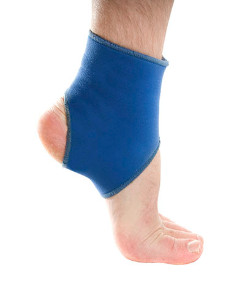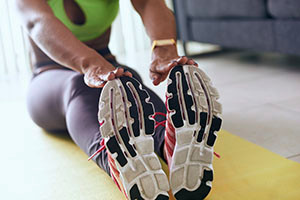Items filtered by date: September 2020
Why Live with Pain and Numbness in Your Feet?
Symptoms of Peripheral Neuropathy
 Peripheral neuropathy is a disorder that causes a malfunction in the nerves that send signals from the rest of your body to the brain and spinal cord. Symptoms of peripheral neuropathy include a sharp, stabbing pain and numbness or weakness in the feet. You may feel a tingling sensation in the feet, a buzzing or shock, or a sensation similar to wearing a tight sock. Peripheral neuropathy can also cause symptoms throughout the whole body, such as thinning of the skin, a drop in blood pressure, digestive problems, and excessive sweating. If you are experiencing the symptoms of peripheral neuropathy, it is recommended that you see a podiatrist for treatment.
Peripheral neuropathy is a disorder that causes a malfunction in the nerves that send signals from the rest of your body to the brain and spinal cord. Symptoms of peripheral neuropathy include a sharp, stabbing pain and numbness or weakness in the feet. You may feel a tingling sensation in the feet, a buzzing or shock, or a sensation similar to wearing a tight sock. Peripheral neuropathy can also cause symptoms throughout the whole body, such as thinning of the skin, a drop in blood pressure, digestive problems, and excessive sweating. If you are experiencing the symptoms of peripheral neuropathy, it is recommended that you see a podiatrist for treatment.
Neuropathy
Neuropathy can be a potentially serious condition, especially if it is left undiagnosed. If you have any concerns that you may be experiencing nerve loss in your feet, consult with Dr. Ronald Sheppard from Warren-Watchung Podiatry Center. Our doctor will assess your condition and provide you with quality foot and ankle treatment for neuropathy.
What Is Neuropathy?
Neuropathy is a condition that leads to damage to the nerves in the body. Peripheral neuropathy, or neuropathy that affects your peripheral nervous system, usually occurs in the feet. Neuropathy can be triggered by a number of different causes. Such causes include diabetes, infections, cancers, disorders, and toxic substances.
Symptoms of Neuropathy Include:
- Numbness
- Sensation loss
- Prickling and tingling sensations
- Throbbing, freezing, burning pains
- Muscle weakness
Those with diabetes are at serious risk due to being unable to feel an ulcer on their feet. Diabetics usually also suffer from poor blood circulation. This can lead to the wound not healing, infections occurring, and the limb may have to be amputated.
Treatment
To treat neuropathy in the foot, podiatrists will first diagnose the cause of the neuropathy. Figuring out the underlying cause of the neuropathy will allow the podiatrist to prescribe the best treatment, whether it be caused by diabetes, toxic substance exposure, infection, etc. If the nerve has not died, then it’s possible that sensation may be able to return to the foot.
Pain medication may be issued for pain. Electrical nerve stimulation can be used to stimulate nerves. If the neuropathy is caused from pressure on the nerves, then surgery may be necessary.
If you have any questions, please feel free to contact one of our offices located in Marlboro and Watchung, NJ . We offer the newest diagnostic and treatment technologies for all your foot care needs.
Caring for Ankle Sprains
 A sprained ankle is a common injury. It can occur quite easily just from a quick sideways movement or a twist of the ankle during sports or everyday activities. Sprained ankles vary in their severity, and medical intervention is usually necessary. In addition to following the doctor’s orders, you can help your ankle heal at home by following the R.I.C.E. acronym. Rest your ankle by avoiding activities that cause pain and discomfort. Ice your ankle for about 20 minutes at a time during the first two days after your injury. Compress your ankle by wrapping it with an elastic bandage or brace to help stop swelling. Elevate your ankle above the heart as often as possible to reduce swelling. If you have sprained your ankle, it is recommended that you are under the care of a podiatrist.
A sprained ankle is a common injury. It can occur quite easily just from a quick sideways movement or a twist of the ankle during sports or everyday activities. Sprained ankles vary in their severity, and medical intervention is usually necessary. In addition to following the doctor’s orders, you can help your ankle heal at home by following the R.I.C.E. acronym. Rest your ankle by avoiding activities that cause pain and discomfort. Ice your ankle for about 20 minutes at a time during the first two days after your injury. Compress your ankle by wrapping it with an elastic bandage or brace to help stop swelling. Elevate your ankle above the heart as often as possible to reduce swelling. If you have sprained your ankle, it is recommended that you are under the care of a podiatrist.
Although ankle sprains are common, they aren’t always minor injuries. If you need your ankle injury looked at, contact Dr. Ronald Sheppard from Warren-Watchung Podiatry Center. Our doctor can provide the care you need to keep you pain-free and on your feet.
How Does an Ankle Sprain Occur?
Ankle sprains are the result of a tear in the ligaments within the ankle. These injuries may happen when you make a rapid shifting movement while your foot is planted. A less common way to sprain your ankle is when your ankle rolls inward while your foot turns outward.
What Are the Symptoms?
- Pain at the sight of the tear
- Bruising/Swelling
- Ankle area is tender to touch
- In severe cases, may hear/feel something tear
- Skin discoloration
Preventing a Sprain
- Wearing appropriate shoes for the occasion
- Stretching before exercises and sports
- Knowing your limits
Treatment of a Sprain
In many cases, the RICE method (Rest, Ice, Compression, and Elevate) is used to treat ankle sprains. However, you should see a podiatrist to see which treatment option would work best with your injury. In severe cases, surgery may be required.
It is important to ask your doctor about rehab options after you receive treatment for your injury. Stretching, strength training, and balance exercises may help the ankle heal while also preventing further injury.
If you have any questions, please feel free to contact one of our offices located in Marlboro and Watchung, NJ . We offer the newest diagnostic and treatment technologies for all your foot care needs.
Should I Gradually Increase My Running Mileage?
The warm months of the year may encourage people to pursue the sport of running. This is considered to be a popular hobby, and methods can be implemented that may help to prevent running injuries from occurring. These can consist of wearing shoes that fit correctly, alternating between running and walking, and gradually increasing the mileage that is run each week. Research has indicated that it is best to let your feet rest between runs, and drinking plenty of water may help to increase hydration. There are numerous injuries that can happen to the feet while running, and it is suggested to consult with a podiatrist for additional ways on how to prevent running injuries.
Exercising your feet regularly with the proper foot wear is a great way to prevent injuries. If you have any concerns about your feet, contact Dr. Ronald Sheppard of Warren-Watchung Podiatry Center. Our doctor will treat your foot and ankle needs.
How to Prevent Running Injuries
Many common running injuries are caused by overuse and overtraining. When the back of the kneecap starts wearing out and starts causing pain in your knee, this is commonly referred to as runner’s knee. Runner’s knee is a decrease in strength in your quadriceps and can occur if you’re not wearing properly fitted or supporting shoes. To prevent runner’s knee, focusing on hip strengthening is a good idea, as well as strengthening your quads to keep the kneecaps aligned.
What Are Some Causes of Running Injuries?
- One cause of a common running injury is called iliotibial band syndrome.
- Plantar fasciitis is also another common injury.
- Stress fractures can occur from overtraining, lack of calcium, or even your running style.
Best Ways to Prevent Running Injuries
- Wear footwear that fits properly and suits your running needs.
- Running shoes are the only protective gear that runners have to safeguard them from injury.
- Make a training schedule. Adding strengthening exercises as well as regular stretching can help keep you strong and limber and can lessen the possibility of injuries.
- Stretching keeps muscles limber; this will help you gain better flexibility.
If you have any questions please feel free to contact one of our offices located in Marlboro and Watchung, NJ . We offer the newest diagnostic and treatment technologies for all your foot and ankle needs.
Injections for Plantar Fasciitis
 Plantar fasciitis is a foot condition caused by inflammation of the plantar fascia, a band of tissue that runs along the bottom of the foot. The most common symptom of plantar fasciitis is a sharp pain in the foot. There are multiple treatment options for plantar fasciitis depending on the severity of your condition. In more severe cases, where other treatment options have had minimal success, injections into the foot may provide relief. Cortisone injections can reduce or eliminate inflammatory pain. Platelet rich plasma (PRP) injections use platelets from your own blood to promote healing in damaged tissue. If you have plantar fasciitis, please consult with a podiatrist to find the right treatment for you.
Plantar fasciitis is a foot condition caused by inflammation of the plantar fascia, a band of tissue that runs along the bottom of the foot. The most common symptom of plantar fasciitis is a sharp pain in the foot. There are multiple treatment options for plantar fasciitis depending on the severity of your condition. In more severe cases, where other treatment options have had minimal success, injections into the foot may provide relief. Cortisone injections can reduce or eliminate inflammatory pain. Platelet rich plasma (PRP) injections use platelets from your own blood to promote healing in damaged tissue. If you have plantar fasciitis, please consult with a podiatrist to find the right treatment for you.
Plantar fasciitis can be very painful and inconvenient. If you are experiencing heel pain or symptoms of plantar fasciitis, contact Dr. Ronald Sheppard from Warren-Watchung Podiatry Center. Our doctor can provide the care you need to keep you pain-free and on your feet.
What Is Plantar Fasciitis?
Plantar fasciitis is the inflammation of the thick band of tissue that runs along the bottom of your foot, known as the plantar fascia, and causes mild to severe heel pain.
What Causes Plantar Fasciitis?
- Excessive running
- Non-supportive shoes
- Overpronation
- Repeated stretching and tearing of the plantar fascia
How Can It Be Treated?
- Conservative measures – anti-inflammatories, ice packs, stretching exercises, physical therapy, orthotic devices
- Shockwave therapy – sound waves are sent to the affected area to facilitate healing and are usually used for chronic cases of plantar fasciitis
- Surgery – usually only used as a last resort when all else fails. The plantar fascia can be surgically detached from the heel
While very treatable, plantar fasciitis is definitely not something that should be ignored. Especially in severe cases, speaking to your doctor right away is highly recommended to avoid complications and severe heel pain. Your podiatrist can work with you to provide the appropriate treatment options tailored to your condition.
If you have any questions please feel free to contact one of our offices located in Marlboro and Watchung, NJ . We offer the newest diagnostic and treatment technologies for all your foot and ankle needs.


